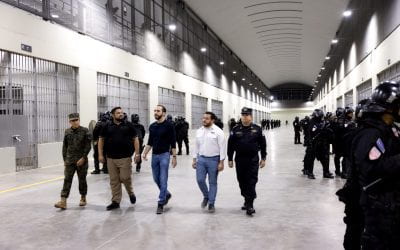(in the Era of Covid…there’s also SOCCER)
Behind Argentina’s Wild, Viral World Cup Celebrations
This is the first time a global Argentina has experienced the World Cup so thoroughly and joyously online.
Earlier this month, when Argentina defeated Poland 2-0 to advance to the knockout stage of the 2022 FIFA World Cup, a couple of guys in Buenos Aires went out to celebrate in the street and passed an elderly woman alone on the corner, wearing a mask and happily waving an Argentine flag. In their revelry they surrounded her, jumping up and down and chanting: “Abuela, lalala la la / Abuela, lalala la la” to the tune of many popular local soccer chants. But a video of them soon went viral, and so when Argentina defeated Australia 2-1 the following weekend, they returned to her street corner—this time with a few more people, playing drums and setting off smoke flares—and found her there again, awaiting them with her mask and her flag. By the time Argentina reached the final earlier this week, the now-legendary Abuela (who does not have grandchildren of her own) had gained thousands of delirious, shirtless fans, who met on the same street corner again and again, launching fireworks and dancing jubilantly around the likely confused but very happy woman.
All month, raucous Argentine celebrations like these have grown more and more viral on social media platforms like TikTok, with millions of likes and billions of views. In videos from apartment balconies in Buenos Aires, you can hear the city erupt with every goal. Crowds can be seen flooding the major intersections of the capital, famous neighborhood gathering spots like Canning y Corrientes, Cabildo y Juramento, and the iconic Obelisk in the city center. They ride atop moving buses, hang from traffic lights, and climb flagpoles with impressive strength. A new song, “Muchachos, Ahora Nos Volvimos a Ilusionar”—with lyrics that depict Diego Maradona, with his parents in the afterlife, cheering on Messi to the world championship—has become emblematic of the national team’s historic run, breaking out at concerts, in airports, and even at mass.
This year’s never-before-seen level of devotion has made for an astonishing spectacle—even within Argentina, widely known to be a soccer-obsessed country. But it is also the first time that the expansive global Argentine community, of which I am a part, has been able to experience a World Cup so thoroughly and joyously online. Our songs and celebrations have found admirers across the globe: from Americans new to the beautiful game to millions of passionate Bangladeshis who have adopted the selección as their own. No longer do we have to search on YouTube for specific videos of Argentine announcers sobbing with joy after each victory; now, TikTok already knows it’s what we want to see, and the videos, somehow, find us. And so we take to the Internet, whatsapp-ing them to each other, each one seemingly better than the last.
I have been watching these kinds of videos for a decade now, seeking them out like water in the desert. But this year’s deluge—capped, tremendously, by Argentina ending a 36-year-wait to lift its third World Cup trophy—has on multiple occasions moved me almost to tears. And I have started to wonder why.
Like many others born to families of Argentine descent abroad, I have never experienced a World Cup in Argentina myself. I grew up in the New York suburbs, with paternal grandparents from Buenos Aires who moved to the U.S. in the 1960s, watching the selección in relative solitude—celebrating goals passionately at home with my family, only to run outside afterwards and remember that everyone else had been going about their day as normal. My childhood was marked by the emergence of Lionel Messi, who burst onto the international stage in 2005; one day around that year, when I was eight years old, my father went up to our roof, triumphantly dismantled the old TV antenna, and plugged in a big gray cable box loaded with Spanish-language channels so that we could watch the teenage prodigy play for F.C. Barcelona.
Still, for most of the early 2000s and into the early 2010s, many of the most important Argentina games weren’t broadcast on the regular television stations. My parents would drive with us from town to town in search of places showing them, usually bars far too smoky for children. We searched online for the grainiest of illegal internet streams, during the very beginning of internet video. And every four years, when the long-awaited World Cup appeared on the basic networks, my parents allowed us to miss school on Argentina’s matchday mornings, knowing full well that here, life did not pause for the tournament, as it did there.
This was, admittedly, uncharacteristic of us; we’re hardly a family that regularly watches sports. “Never cancel plans to play soccer in order to watch someone else do it on TV,” my father would often say. Yet Argentina’s national team always proved an exception. I hardly spoke Spanish during childhood—it would take me years to achieve true fluency—but moments, players, and chants became burned into my memory, especially from the early Messi era. There was his goal during the 6-0 win against Serbia & Montenegro in his 2006 World Cup debut—and Maxi Rodríguez’s extra-time stunner against Mexico a few rounds later, when my father put my youngest brother on his shoulders and ran around our block with a flag draped down his back. In the 2010 qualifiers, Martín Palermo put Argentina through to South Africa with a desperate last-minute winner in a downpour that saw then-coach Diego Maradona belly slide across the soaking wet grass in celebration. Despite these moments of elation, a rotating cast of coaches—like Maradona, José Pékerman, Alfío Basile, and ultimately Alejandro Sabella—could never seem to avoid what seemed like inevitable heartbreak.
For my brothers and me, knowledge of Argentina’s soccer team that bordered on fanaticism made up for a kind of imposter syndrome common among people like us, born in America to families that have not too long ago come from somewhere else. Much as my childhood was marked by the Messi era, it was also marked by uncertainties of belonging, inextricably tied to questions of language, of identity, of heritage. In the eyes of most Argentines in Argentina, my family are now considered “yankees” first—but in the eyes of other Americans at home we’re certainly thought of as Argentine, an identity that is seemingly often defined, in this country at least, by sport.
As I grew older, in college and into adulthood, I began traveling to Argentina more frequently, spending extended periods living and working in Buenos Aires both on my own and with family. Interestingly, it was precisely these very joyful and often very specific memories of the selección, obscure to my friends back home, that suddenly became my unexpected currency in a culture at once foreign and familiar—for starting conversations, for feeling accepted, for feeling Argentine for the very first time. There were, in fact, millions of others who remembered when Ángel Di María delivered Argentina an Olympic gold medal in 2008, when Gabriel Heinze smacked the television camera to the ground after a goal in 2010, when Gonzalo Higuaín and Sergio Agüero hit their best form in the years that followed! As I spoke of these things and others, I adopted a more clearly Argentine-accented Spanish—albeit with an American twinge that will never fully fade—thanks, in large part, to so many hours listening to Telemundo Deportes and TyC Sports. These conversations happened, increasingly, over shared mate, over long dinners, over soccer games at rented neighborhood fields in the capital. Watching Messi, and following the Albiceleste, with so much devotion from afar brought me closer to a home I didn’t know I had.
Back in the U.S., this year’s newly viral videos—of wild celebrations in the streets, of dancing with abuelas, of popular songs thundering across the world—have had huge effect. Increasingly, people took to congratulating our family after each Argentina win, shaking our hands in town and at school as though we’ve achieved something ourselves. And across the United States, longtime Facebook groups—including Argentinos en New York, Argentinos en Washington DC and Argentinos en North Carolina—were overrun with requests to arrange banderazo celebrations at central American gathering points like Times Square and the Washington Monument (our own obelisco). We are reminded, too, that many of Argentina’s fútbol heroes have made their lives outside of the country; that Andrés Cantor, the Argentine-American voice of Telemundo Deportes who burst into tears as he declared Argentina champion of the world, also left his homeland at 18 for the United States.
In the years to come, many of us will continue to celebrate goals loudly and lonely on quiet town streets, heartened to know that in Buenos Aires we would be adding to a much, much larger chorus of cheers. It’s a special thing, to feel like you belong—to a community, a culture, to anything bigger than yourself—even if in the smallest of ways. That’s why this weekend for the final, to mark the end of the era that made me Argentine in America, I showed up to my Abuela’s house in the suburbs with a drum and a flag, and I sang for her.
Dale campeón. Qué lindo es ser argentino.

Source: FIFA via Getty Images
Jordan Salama is a resident writer at National Geographic. His first book, Every Day the River Changes, a journey down Colombia’s Río Magdalena, was published in 2021. Follow him on Instagram: @jordansalama19
Related Articles
Haiti: A Gangster’s Paradise
Haiti is in the news. In recent weeks, gangs have coordinated violent actions, taken to the streets and liberated thousands of inmates to spread chaos and solidify their control of the Port-au-Prince capital.
Crime and Punishment in the Americas
As 2024 ushered in, newly-elected Ecuadorian President Daniel Noboa issued a state of emergency in his country, citing a wave of gang violence spurred by the prison escape of a local criminal leader with ties to Mexico’s ruthless Sinaloa Cartel.
Women CEOs in Latin America: Overcoming obstacles, navigating through challenges
I first arrived in Latin America in 1997, and since then, I’ve been involved in education and the development of leadership and governance issues in the region. During these 27 years—12 of them from Spain—I have had the opportunity to interact with leaders from the region, the private and public sectors, multinationals and small and medium-sized enterprises, and various industries.




